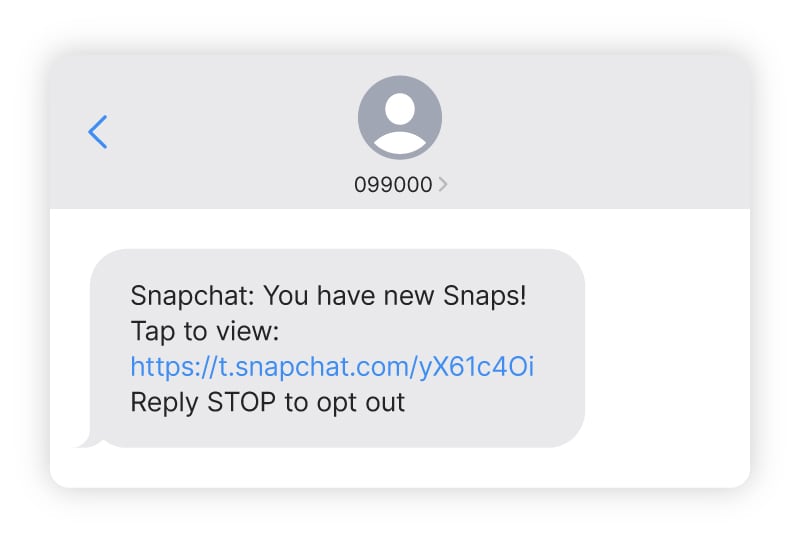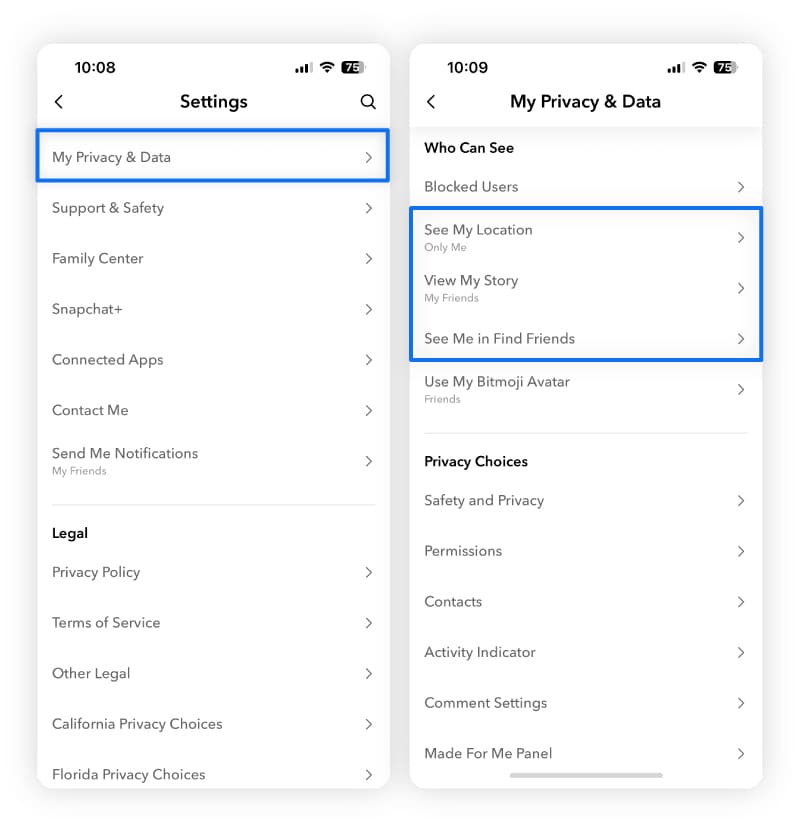Real user example: A Reddit user was contacted by an alleged scammer after signing up for a seemingly real casting advertisement on Snapchat. The person kept calling and sending texts inviting the Redditor to attend a virtual call.
Snapchat has more than 900 million monthly active users, making it a popular target for cybercriminals. Scams on Snapchat range from launching account takeovers to convincing you to hand over money or sensitive info.
While most of the scams seen on Snapchat aren’t exclusive to the app, the private, temporary nature of the messaging platform likely makes it an attractive option for scammers. In this article, we’ll explore the 13 most common Snapchat scams and offer you tips on spotting and stopping these scams.
1. Phishing
While more common through email, phishing scams do appear on Snapchat. Most often, scammers use this technique by sending targets fake Snapchat support messages, although they can also pose as other legitimate brands. The goal of this type of attack is to steal your login details or personal information. The scammer can then take control of your Snapchat account and pose as you to draw in more victims.
- Tell-tale signs: A support link that redirects you outside of Snapchat, urgent “verify now” messages, misspelled domains, or shortened URLs that seem suspicious.
- What to do: If you find yourself redirected from Snapchat to a page that requests your login info or other sensitive information, close the browser window. You should also report the scam in the Snapchat app.
A phishing attack is often the first step in other common Snapchat scams. To protect yourself, be cautious anytime you receive a link — it may not be obvious right away that it will redirect you. And remember, Snapchat support will never email or otherwise contact you and ask for your Snapchat login information.


2. Romance scam
A romance scam, also known as an online dating scam, involves tricking a person into believing they're in a romantic relationship with someone they met online. But in reality, the love interest is a catfish who assumes a fake identity to gain the trust of their target.
Once a foundation of trust is built, the scammer begins asking for money and gifts, all while keeping their target at arm's length. They may even move the conversation off the platform to apps likeSnapchat, WhatsApp, or Telegram to avoid detection. This could be the start of a blackmail scam.
- Tell-tale signs: Love bombing, being contacted by someone you don’t know out of the blue, and suddenly receiving explicit pictures or videos, or requests for money.
- What to do: Report explicit messages and requests for money to Snapchat support and block the sender.
According to the FTC, romance scams are among the most lucrative — half of those who lost money to a romance scam from January through June of 2023 say the communication began on Facebook, Instagram, or Snapchat. So, if you suspect the person you’re e-dating is too good to be true, trust your gut and cut off the relationship.
If you need more proof, try running the pictures they send through a reverse image search tool and an AI image checker to see if they’ve been stolen or faked.
3. Fake contest scam
Scammers sometimes create phony contests or giveaways to trick Snapchat users into believing they have a chance to win valuable prizes. In reality, these contests are designed to steal personal information and extort money from participants. Ultimately, no contest participant wins an award.
- Tell-tale signs: Requesting personal information, requiring an entry fee, not publishing the contest rules, and promising to-good-to-be-true prizes.
- What to do: Report suspicious giveaways to Snapchat support so they can investigate and remove the post if it’s fraudulent.
To determine if a Snapchat contest is a scam, look closely at who’s hosting it. Most of the time, only verified influencers or businesses will host legitimate contests. They also shouldn’t ask you for money or overly personal information, and they’ll adhere to lottery and sweepstakes laws.
4. Imposter scams
In Snapchat imposter scams, cybercriminals impersonate people their targets will trust or look up to — usually a friend, celebrity, or business. Scammers do this to deceive and manipulate their targets, hoping that young Snapchat users get carried away by their excitement. Once a target is invested in the hoax, the scammer can convince them to send money.
- Tell-tale signs: Sending unsolicited friend requests, writing spammy and misspelled messages, avoiding video calls, and using fake photos.
- What to do: Look up the person’s profile to see if duplicate results appear. You can also use Snapchat’s Friend Check Up feature to easily remove spam accounts or anyone you’re not interested in talking to from your friends list.
The best way to avoid getting duped in an imposter scam is to trust your instincts. If it doesn’t make sense that the person is messaging you, it’s probably not them. But if you’re unsure, check the sender’s profile information to make sure it matches the username and display name the person uses on other social networks.
Also, if you believe you’re talking to a celebrity, check to see if it’s a verified Snap Star account with a black star inside of a yellow circle.
5. Account recovery scam
An account recovery scam on Snapchat consists of scammers posing as official IT support agents. Scammers claim that a Snapchatter’s account has been compromised and requires verification or a new password. When successful, they persuade users to share personal information, such as login credentials. Using these details, they can take over the Snapchat account and use it to scam others.
Alternatively, the fake support agent might try to convince their target that their account was locked and they can only restore it if they pay a fee. In cases like these, they will usually ask the account holder to make a payment with gift cards or through a peer-to-peer (P2P) payment app like CashApp.
Real user example: One common scam discussed on Reddit involves scammers claiming they can help you recover a locked or deactivated Snapchat account… but only for a fee.
- Tell-tale signs: Receiving unsolicited messages from Snapchat Support, requesting personal information, and requesting payment to uncover an old account.
- What to do: Only reset your password using official emails that you request yourself. Avoid opening support messages if you didn’t request assistance.
Don’t open unsolicited messages or links from Snapchat support. Often, the company will send you updates from the official “Team Snapchat” account on the app. However, they won’t contact you via text, email, or the app about your account unless you ask for help.
6. Adult content scam
Sometimes referred to as premium account scams, adult content scams on Snapchat typically involve an individual posing as an adult content creator on popular platforms like OnlyFans. This “creator” is generally someone who stole another person’s suggestive or explicit content to sell or used deceptive AI to create deepfake images and videos.
Often, the intent of these scams is simply to exploit unoriginal content for financial gain. However, it can lead to more in-depth impersonation scams.
- Tell-tale signs: Receiving unsolicited friend requests that offer premium deals or contain suspicious links. Also demanding payment and posting inconsistent content are red flags.
- What to do: Report these scams to local law enforcement, as they often involve forays into the world of fraud and other illegal activities. However, if you’re concerned about possible legal repercussions for engaging with an adult content creator, you can also consider speaking with an attorney about your options first.
If someone adds you on Snapchat out of the blue and immediately starts sending provocative messages, images, or videos, and asking for money, block them. Legitimate adult content creators typically use an official channel or app and won’t ask you to send random payments via Snapchat.
7. Blackmail scams
In blackmail scams, sometimes called “sextortion” scams, fake users lure victims into sending them nude or compromising pictures. The images are then used to blackmail the person, with the scammer requesting money to not post the pictures online. This is why these scams are often referred to as sextortion scams.
Real user example: A Reddit user was contacted out of the blue by a girl. However, the conversation quickly turned explicit, and she requested nudes. Luckily, the user spotted red flags before sending them and dodged potential sextortion.
- Tell-tale signs: A new “friend” suddenly starts sending explicit pictures and then requests them from you.
- What to do: Report sextortion scams to Snapchat immediately. If you catch the scam too late, do not pay the blackmailer, and contact your local law enforcement agency.
Sextortion scams can occur as part of an ongoing romance scam or suddenly with new friends sending you explicit snaps that you didn’t request. If you’re asked for nudes back, don’t send them. Even though snaps are temporary, third-party apps, hacking attempts, and even simple screenshots can preserve those pictures for far longer.
8. Employment and investment scams
In employment and investment schemes, scammers lure Snapchatters in by offering high-pay, low-effort opportunities. These scams usually involve an upfront start-up fee or cryptocurrency investment, but don’t seem to have any substantial catches at first glance. However, these often turn out to be multi-level marketing schemes (MLMs), fake investments, or nonexistent job opportunities.
Real example: In late 2024, viral sensation Haliey Welch was accused of driving a pump-and-dump scam after her newly-launched meme coin ($HAWK) dropped 95% of its value within hours of launching. Welch and her team denied the scam claims and she was not formally charged.
- Tell-tale signs: Unsolicited job offers, influencers with no apparent financial background selling you financial advice or investment opportunities, and unsolicited contacts or recruiters promising fast money.
- What to do: Report employment and investment scams to agencies like the Federal Trade Commission (FTC).
To avoid getting tricked, slow down and do some research before applying for jobs or signing new contracts. Typically, you can simply Google the person’s or business’s name to find reviews or mentions of scams, which can help gauge the credibility of the offer.
9. Meet-up scam
Meet-up scams are often part of a larger romance scheme, but scammers can also use them in other scenarios. For instance, scammers might pose as talent agents, record producers, photographers, promoters, or even old friends. Regardless of the scheme, scammers will try to exploit their targets’ emotions and aspirations to trick them into sending money without ever intending to meet up.
- Tell-tale signs: Invitations from strangers to meet up, inability to nail down meetup specifics with a contact, and fee requirements to join a meetup or outing that you were invited to.
- What to do: Cut your losses and block them — never send them money for gas or transportation.
If someone asks you to meet up with them, whether in a friend or professional capacity, look them up on the internet and social media to ensure they are who they claim to be. If you find them online, but their personality or writing style seems different from the person you’re talking to, reverse image search any photos they sent to see if they’re stolen.
10. Sugar momma or daddy scam
Faux sugar daddies and mommas often target younger people, promising to share their wealth for romance, companionship, or just out of the goodness of their hearts. Most of the time, these Snapchat scammers adopt the persona of an older, financially stable person to help sell the ruse.
Real user example: In a recent California case, a teenager fell for a fake sugar baby offer, where the scammer asked him to “donate” funds via Zelle to a family friend, then sent him fake checks to cover the cost. The scam ultimately put the teenager $8,500 in debt to his bank when the checks bounced.
- Tell-tale signs: Someone sending unsolicited sugar baby offers, promising financial gifts but not following through, asking you to pay them first to cover processing fees, or requiring you to give them your bank account details.
- What to do: Call your bank right away to stop unauthorized transactions. You should also file a report with your local police department.
If you’re actively looking for a relationship, either as a sugar baby or a sugar daddy/momma, be wary of offers from users demanding personal information such as your bank account number or Social Security number (SSN).
11. Survey scam
In survey schemes, scammers may create a fake Snapchat account to impersonate a legitimate business, celebrity, or influencer. Then, they try to convince the people who subscribe to the account to fill out a survey for a chance to win a prize or earn money. However, when unsuspecting Snapchatters follow the malicious link to complete the survey, they are usually redirected to an infected website.
- Tell-tale signs: Guaranteeing impressive payments for simply filling out surveys, sending links to unverified websites, messages with bad spelling and grammar, and badgering you to enter sensitive information into a survey.
- What to do: If a survey is asking for too much information, just close it — no prize or payment is worth the risk. And if the survey directs you away from Snapchat to a spoofed site, quickly close it, clear your browser cache, and restart your phone.
To keep scammers from stealing your personal information, only participate in surveys conducted by well-known companies or by a trusted sender. Remember that safe surveys will never ask for payment details or sensitive information.
12. Charity scam
In charity scams, most Snapchat tricksters will create a fake account for a legitimate non-profit organization to solicit donations. In these cases, they will generally spoof a website so the scammer can divert funds into their personal account.
In other cases, an individual may pretend to collect donations for a worthy cause. These scammers usually ask their friends and followers to donate through payment services or crowdfunding platforms, such as Venmo, Cash App, or GoFundMe. Then, once they receive the money, they pocket it instead of sending it to the charity.
Real user example: One redditor recently reported that his brother was scammed out of $50 on Snapchat, where a fake user claimed they were from Gaza and desperately needed food for money.
- Tell-tale signs: Unknown individuals requesting personal information to verify your donation, not having an official website, impersonating well-known charities, and asking for donations through gift cards or cryptocurrency.
- What to do: In many cases, it’s difficult (if not impossible) to recover funds lost in charity scams. However, you can try to dispute the transaction with your bank, notify law enforcement, and file a complaint with the FTC (at ReportFraud.ftc.gov). Only donate to legitimate organizations.
Unknown and unverified Snapchatters asking for donations are often scammers. Be cautious of strangers with sob stories who say they’ll pass on the money you donate without providing more details.
13. Catfishing
Similar to romance scams, catfishing on Snapchat involves developing a relationship with victims. These relationships are often romantic in nature, but may also take the form of a scammer posing as a popular influencer under the guise of mentorship, for instance.
Scammers create fake Snapchat profiles and quickly build a relationship with victims. Then they request personal information or payment in most cases; however, some catfishers perpetrate this scam for their own entertainment, with no intent to commit financial fraud.
- Tell-tale signs: Unsolicited messages from unverified profiles, or images that are inconsistent or suspicious.
- What to do: Use a reverse image search to verify a profile is fake, take screenshots of the evidence, and block the user on Snapchat.
Catfishers create two victims: You and the person they are impersonating. If you run across a catfisher who is posing as a real person, it's worth reaching out to let that person know their identity has been stolen and is being used for fraud.
How Snapchat scams can lead to identity theft
One goal of Snapchat scams is to obtain your personally identifiable information (PII), such as your phone number, address, and even photos in some cases. Using this information, scammers may try to take over your Snapchat account and impersonate you. They may then reach out to your friends and try to scam them out of information and money as well.
Scammers can also use your sensitive data to commit other forms of identity theft, like making fraudulent purchases in your name or opening a loan using your stolen Social Security number. They could also sell your info on the dark web.
With protection from LifeLock, you can stay one step ahead with alerts for changes to your credit, suspicious activity on social media, and dark web surveillance. Not sure which features you need in an identity theft protection tool? Take the LifeLock quiz to see which plan works best for you.
Snapchat scam warning signs
While scammers use different techniques, you can spot scams by looking for a few similar warning signs. From unsolicited contact to poor grammar usage, here are some common signs that you’ve been targeted by a Snapchat scam:
- Urgent or emotional messages: Common tactics include lovebombing or telling sad stories to get you emotionally invested.
- Unsolicited contact: If you suddenly get chats or snaps from someone you don’t know, this could be a red flag.
- Requests for money, codes, or personal info: Approach upfront requests for personal information or money with caution, even if they promise you money or prizes.
- Poor grammar or unusual usernames: When you receive rushed messages or those with multiple grammatical mistakes, it's typically a red flag.
- Unverified accounts: Always be suspicious and confirm if the user claims to be a Snapchat representative, a celebrity, or a well-known brand.
- Too-good-to-be-true offers: A prize or job offer that seems unbelievable or suspicious is likely a scam.
If you spot any of the above signs of a potential scam, report it immediately, both on Snapchat and to external agencies such as the FTC and the Internet Crime Complaint Center (IC3). You may also want to reach out to local law enforcement, especially if you’ve already been scammed out of money.
How to protect yourself against Snapchat scammers
You can help protect yourself against Snapchat scams by paying close attention to small details, especially when interacting with strangers and unfamiliar influencers. Here are some best practices to protect yourself from Snapchat scams.
- Don’t open suspicious links: Snapchat allows you to preview external links before opening them. So, before clicking links or scanning QR codes, double-check the logo, business name, and URL to verify their legitimacy.
- Hide your Snap Map location: Going ghost can keep scammers from stalking you or stealing your information to scam others.
- Don’t accept friend requests from strangers: While some people do legitimately use Snapchat to make new friends, you should be wary of incoming friend requests from people you don’t know. You can even disable the Quick Add feature.
- Use a strong password: Choose a strong password to help prevent hackers from getting in and taking over your account. You can also set up 2FA for an extra layer of login protection.
- Don’t send money to people you don’t know IRL: Snapchat scammers put a lot of effort into convincing you that they’re worthy of your help, or that sending the money will benefit you in the long run. Don’t fall for it.
- Don’t post personal information: It can be easy to overshare on platforms like Snapchat. However, you need to be careful about what you post. Avoid posting your full name and any personally identifiable information. Never give out your Snapchat login info, and set your “See My Location” feature to “Only Me.”


What to do if you’ve been scammed on Snapchat
If you’ve been scammed on Snapchat, you’ll want to protect your information, stop the fraudsters, and potentially recover scammed money. For your best chance at this, here are nine steps to follow the second you realize you’ve been scammed:
- Take screenshots as evidence: You can then provide them to Snapchat, the authorities, and your financial institution as needed.
- Block the scammer: You can do this using Snapchat’s block feature, then block them anywhere else they may have contacted you (e.g., email, iMessages, or other messaging apps).
- Report the incident to Snapchat: Use the report feature on the individual snap, chat, or on the scammer’s profile page.
- Scan your device: Remove any malware or spyware that you may have accidentally downloaded by using a thorough antivirus scan.
- Change your password: Consider enabling 2FA on Snapchat to help prevent the scammer from taking over your Snapchat account.
- Report financial loss: Losses need to be reported to your bank or credit card issuer along with any evidence that you’ve gathered.
- Report identity theft: You can report identity theft online to the FTC or IC3 or in person to local law enforcement.
- Increase your privacy settings: Limit who can see your profile, read your stories, and contact you on Snapchat.
- Continually monitor your financials and credit: Look for any suspicious activity, and consider setting up a credit freeze if you gave scammers personal info.
The easiest way to report a Snapchat scammer is to do so directly in the app. Here are a few quick steps:
- Find a recent chat or snap from the scammer.
- Press and hold on the scammer’s username.
- Select the More option (three dots) from the menu.
- Tap the Report option and select the reason why.
You can also report a user directly from their profile page using the Manage Friendship option. If the scammer blocked you first, you can contact Snapchat support to report the scam.
Before you block the fraudster, consider taking screenshots first. This can prove valuable evidence if you later need to file a police report or document identity theft.
Protect your identity and social accounts beyond Snapchat
Don’t let money-hungry Snapchat scammers pull a fast one on you or steal your identity to trick others. Instead, use LifeLock Total to help protect your personal information and recover your identity in the case of theft. LifeLock can also help monitor your social media accounts, provide alerts if your SSN or other personal info is used without your consent, and notify you of account takeovers.
FAQs
Is Snapchat safe for my kids?
Snapchat is not appropriate for kids younger than 13. Snapchat requires users in the U.S. to be at least 13 years old, and the company provides stronger default protections for teens 13-17. Teenagers who are 16 or older have access to public profiles, so to remain safe and secure, they need to be on the lookout for scams and follow general internet safety guidelines. Age verification may differ in other locations.
Can I monitor my kids’ Snapchat accounts?
Yes, you can use Snapchat Family Center to see who’s on your teen’s friends list and who they’re talking to. The app also allows parents to limit the types of content that appear in Stories and Spotlight.
Are the text messages I get from Snapchat scams?
Yes, text messages that appear to be from Snapchat are typically scams. In most cases, the multimedia messaging app will send users push notifications from the app or emails to communicate.
Can someone steal my identity through Snapchat?
Yes. Any attack where a scammer successfully obtains personal information, such as your date of birth, Social Security number, or financial information can result in identity theft.
Can scammers use my Snapchat photos or videos for identity theft?
Unfortunately, scammers can use the photos and videos you post on Snapchat to steal your identity by creating fake profiles in your name or outright impersonating you.
Editor’s note: Our articles provide educational information. LifeLock offerings may not cover or protect against every type of crime, fraud, or threat we write about.
This article contains
- 1. Phishing
- 2. Romance scam
- 3. Fake contest scam
- 4. Imposter scams
- 5. Account recovery scam
- 6. Adult content scam
- 7. Blackmail scams
- 8. Employment and investment scams
- 9. Meet-up scam
- 10. Sugar momma or daddy scam
- 11. Survey scam
- 12. Charity scam
- 13. Catfishing
- How Snapchat scams can lead to identity theft
- Snapchat scam warning signs
- How to protect yourself against Snapchat scammers
- What to do if you’ve been scammed on Snapchat
- Protect your identity and social accounts beyond Snapchat
- FAQs
Start your protection,
enroll in minutes.
LifeLock is part of Gen – a global company with a family of trusted brands.
Copyright © 2026 Gen Digital Inc. All rights reserved. Gen trademarks or registered trademarks are property of Gen Digital Inc. or its affiliates. Firefox is a trademark of Mozilla Foundation. Android, Google Chrome, Google Play and the Google Play logo are trademarks of Google, LLC. Mac, iPhone, iPad, Apple and the Apple logo are trademarks of Apple Inc., registered in the U.S. and other countries. App Store is a service mark of Apple Inc. Alexa and all related logos are trademarks of Amazon.com, Inc. or its affiliates. Microsoft and the Window logo are trademarks of Microsoft Corporation in the U.S. and other countries. The Android robot is reproduced or modified from work created and shared by Google and used according to terms described in the Creative Commons 3.0 Attribution License. Other names may be trademarks of their respective owners.







